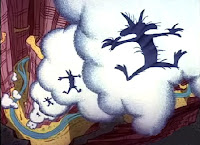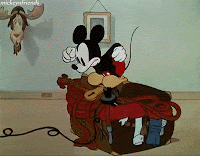December. How the hell is it December already?
Some of you may remember way back at the dawn of the ranty blog, when this site had a completely different format. A bit more block o’text. Then it updated and we could have fancy things like indents. Every now and then I’ll find myself referring back to something from the before-time, and I take that as a good sign this is a topic I could revisit
And sometimes it’s very relevant.
These past few months, I’ve seen a lot of examples of storytellers who didn’t know that much about their characters (or didn’t express it).
And some others who knew way too much about said characters and
decided to communicate it all.
Every single life-experience, thought, and item of clothing.
Character sketches are one of those things that come up a lot when people talk about storytelling.
Novelists and screenwriters talk about them, but in a variety of ways.
Sometimes
very indy films are even called character sketches.
So it’s understandable the term could cause confusion, especially when some folks talk about them as if they’re some vital, necessary thing.
In a visual-artistic sense, a sketch usually isn’t a finished work. It’s when I use a few quick lines and textures to suggest an image rather than forming a complete image. It’s inherently incomplete, but also implies something more than itself.
In a similar sense, a character sketch shouldn’t be an exhaustive list that covers every possible detail of this person’s existence. It’s supposed to give me, the writer, a sense of the character I can refer back to as a guideline. It’s notes about how they talk, how they move, what they like, and what they hate.
Like a fair number of the things I ramble on about her, a character sketch is going to be something that’s
unique to each author.
Probably to each character, as well.
Some characters may need pages of exhaustive notes.
Others may only need a line or two.
And with a few, I may never need to write a single note because I have them perfectly in my mind.
For example
In the book I’m working on right now, I sketched out a short paragraph about most of the characters. I knew Chase was still struggling in the year since he’d lost his family and just not sure what to do with his life—he’d lost his purpose. I knew Murdoch’s trying to figure out if he could leave his family. One of the key things I knew about Katangais that his real name’s Leslie, but he knew how much passengers got a kick out of calling him Katangabecause of the Indiana Jones reference. And Anne…
Well, Anne’s been in my head for almost seven years, itching to tell her story. I didn’t need to write down a single word for her.
So, what is a character sketch? It’s whatever works for you. I’ve found one of the easiest ways to create one, though, is just to ask questions. Not only does this help me get various answers about someone, it also generally leads to other questions about them that develop the character more.
For example… let’s talk about Phoebe.
Also, weird as it may sound after all the times I’ve used it here, this new book is the first time I’ve ever had
a character named Phoebe.
And she isn’t remotely what you’d think of when you hear the name Phoebe.
She is… very different.
So let’s talk about our characters. I’m going to be answering for Phoebe, but you should pick one from something you’re working on right now. I’m going to throw out a list of questions. Answer as you see fit…
Where did they grow up?
Do they get along with their family?
What was their first job?
Did they go to college?
Did they live at college?
Did they finish college?
Republican or Democrat?
How many languages do they speak?
What languages?
What do they do for a living?
What do they want to be doing for a living?
Do they brush and floss regularly?
Do they have any hobbies or collections?
Are they religious?
Do they go to church?
Where do they live?
Where do they want to live?
How do they swear? Like a prude? Like a sailor?
How old were they when they had their first drink?
When they first had sex?
Do they smoke?
Have they ever done drugs?
Do they work out?
What kind of car do they drive?
What kind of car do they want to drive?
Do they have pets?
What did they name their pets?
If I can answer
even half of those questions, that’s a ton of useful information about this character and their background.
Plus, as you probably noticed, each answer implies other facets of their personality.
Knowing all of this is going to give me a much better insight into how they talk and react to the people and world around them and also how they’ll probably react
when things change abruptly for them.

Now, let me jump back to that analogy of artistic sketches and touch on another point.
There’s another art term you may have heard called
negative space.
It’s when I define shapes by the areas around them rather than by the shapes themselves.
Think of the hole in a wall when a cartoon character runs through it.
Sometimes that’s how some writers try to define their characters. They’ll explain this character’s not like those foolish civilians or those dumb idiots or those freakin’ Hollywoodelites. Thing is… this doesn’t actually tell me who anyone is.
Y’see, Timmy, the problem with defining by negatives is that it isn’t actually defining something, it’s just eliminating one option. If I tell you the shirt I’m wearing right now doesn’t have a Star Wars logo on it… I mean, that’s accurate, yeah, but does it really tell you anything useful? If I’m asking you to picture “a shirt without a Star Wars logo,” I’m pretty sure I could get a hundred different responses in the comments and almost guarantee none of them will be what I’m actually wearing.
Okay, yeah, no way I’ll ever get a hundred responses here.
I need to actually define my characters.
Who they are. What they think.
Vagueness can be used to great effect, but more often than not it just shows that I don’t know this stuff.
Phoebe (to fall back on my latest creation) is just going to be
a formless, unrelatable thing that does
whatever the plot needs at the given moment
And one last point,
an idea I’ve mentioned once or thrice before.
Just because I come up with stuff for a character sketch doesn’t mean I need to use it in my work.
Oh, I’ll use all of it to help round out the characters and their history in my head, but just because I came up with a background element
doesn’t mean I need to use it.
Y’see, Timmy (yep, a double Y’see Timmy—it’s Timmception), an all-too-common mistake is when people come up with all these elaborate backstories and then feel the need to squeeze every single detail of them into the actual manuscript. A character sketch is for the writer, not the reader. I know a ton of details about Murdoch and Anne’s past together, and a huge amount about Chase’s screw-ups… but a lot of this isn’t going to be relevant to my book. And if it isn’t relevant in any way… well, I might want to think thrice about making space for it.
Maybe keep that in mind.
Next time, I’d like to talk a bit about holiday movies and triangles. And it might be a little early cause I’ve got a thing.
Until then, go write.
 Now, let me jump back to that analogy of artistic sketches and touch on another point. There’s another art term you may have heard called negative space. It’s when I define shapes by the areas around them rather than by the shapes themselves. Think of the hole in a wall when a cartoon character runs through it.
Now, let me jump back to that analogy of artistic sketches and touch on another point. There’s another art term you may have heard called negative space. It’s when I define shapes by the areas around them rather than by the shapes themselves. Think of the hole in a wall when a cartoon character runs through it. 









